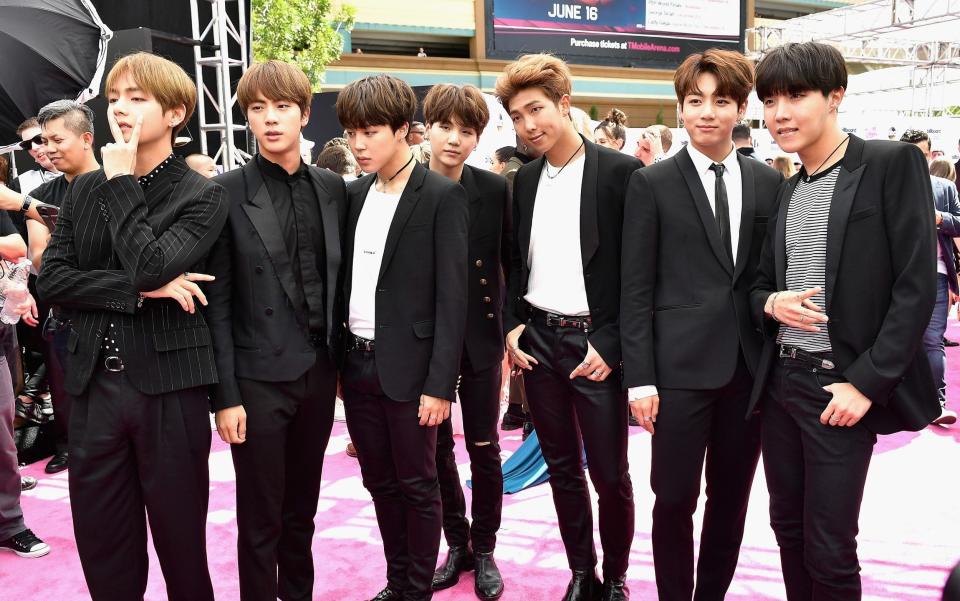K-pop stars look to entertain the US after being barred from China over arms row

South Korean pop stars hope to take the United States by storm after being shut out of the lucrative Chinese market over an arms row.
Since last year, entertainers from the colourful Korean music scene, K-pop, have been mysteriously barred from performing in China in a barely disguised effort by Beijing to pressure Seoul not to deploy America’s THAAD missile defence system.
Media reports in September 2016 quoted Chaebul, South Korea’s leading stock website, as saying the dispute had caused over $140m of damage to the leaders of South Korea’s top-tier entertainment companies so far.
“The impact of THAAD has been substantial,” Ellen Kong, CEO of Elf Asia, a Hong Kong promotion company specialising in K-pop told CNN.
“It’s meant China is no longer a viable market for K-pop touring acts.”

However, the prospect of touring America was given a further boost on Monday after South Korean boy band BTS beat Justin Bieber to become the first K-pop group to win a prestigious US Billboard music award.
The prize was a sign that China’s retaliation may backfire with the K-pop genre now going mainstream in the West.
Despite not singing in English, BTS have already sold out venues in Los Angeles, Chicago and New York. American K-pop enthusiasts are delighted that an unexpected geopolitical twist has now sent many more of their idols stateside in a flurry of concerts.
In 2013, there were just seven K-pop concert tours in the US, compared to 20 in 2016. There have been 14 already this year, including one recently announced by K-pop icon G-Dragon.
The so-called “Korean Wave” of pop culture, has long dominated East Asia, and produced global hits like Psy’s Gangnam Style, which remains to date the most viewed video on YouTube.
The multi-billion dollar K-pop industry, with its promise of legions of adoring fans, has also become an enticing prospect for aspiring western groups.
But American attempts to break into Korean pop culture have not been universally well received.

Jaden Smith, the 18-year-old son of actor Will Smith, revealed plans to launch his own K-pop career this year, and has said it is one of his 'goals for 2017' to become a K-pop star.
His announcement elicited ire from some corners, with one commenter saying: "He knows the K in K-Pop stands for Korean, right?"
Last month all-American boy band, EXP Edition, was accused of trying to take the ‘K’ out of ‘K-pop’ by infuriated fans when it released its first Korean music video. “Retweet if you think four white boys should stick to American pop. It’s really not that hard,” said one angry K-pop fan on social media, amid charges of cultural appropriation.
“K-pop is supposed to be a safe space for Asians to have a platform for entertainment that they often times aren’t given in the West,” said another.
Although the band relocated to Seoul to learn the language, fans questioned their perceived lack of training, compared to South Korean artists who attend militant “K-pop academies” for over a decade before their official debut.
But in an email to The Telegraph, the band’s creators, Bora Kim and Karin Kuroda claimed criticism had “drastically subsided” and that EXP’s reception had been “very successful.”
The band members had trained from childhood in the “cut throat” New York entertainment scene and had not had it easy, they said.
The band was now “evidence of the fact that K-pop is expanding its horizon and becoming more global,” they added. Michael Hurt, a Korean culture expert and professor at Seoul’s Hangkuk University, highlighted the irony of appropriation accusations.
“K-pop became a genre that’s really a fusion of appropriated other, mostly American and actually African American art, especially singing and dancing,” he said. “I think it speaks to the success of K-pop in general to see that the very culture from which they appropriated this from is now trying to enter the fray.”

 Yahoo News
Yahoo News 